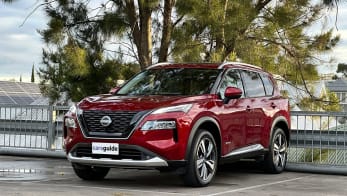What is a Roadworthy Certificate for cars?
A roadworthy certificate, also called a RWC or a safety certificate, is a document provided by an authorised inspector who has deemed a car safe to drive on public roads.
The processes, requirements and costs for roadworthy certificates for cars vary slightly between states and territories, but are usually needed for selling registered used cars, or re-registering either unregistered cars or cars from interstate.
A roadworthy certificate can be an important document for a used-car buyer’s peace of mind, as it means a professional mechanic or inspector has confirmed the car is safe to drive, while state governments require them for registration to avoid letting unsafe cars share the road with motorists.
How to get a roadworthy certificate
For a vehicle to be granted a roadworthy certificate, it must be taken to an inspector approved by the state or territory government, who will check over a list of required elements of the vehicle related to safety.
Generally, this means the inspector will evaluate the car’s wheels and tyres, steering, suspension, brakes, seats and seatbelts, lights and indicators, windows and windscreen, as well as relevant body and structural components for cracks, faults or rust.
Mechanical components like the engine or drivetrain can also be checked for safety issues, such as leaks or dangerous faults.
Some mobile RWC services will also come to you for an inspection, though most inspectors prefer to use a workshop hoist to check underneath the car.
Finding an approved inspector can be as easy as searching ‘RWC near me’ or ‘roadworthy inspection in [your suburb]’, or going to your state’s department of transport website.
Most approved inspection garages will have a sign outside or fairly visible to advertise they are an approved inspection provider, usually a sign provided by the state government.
.jpg)
How long does a roadworthy take
Normally this inspection can be carried out on the same day as the car is delivered to an inspector, even within a couple of hours if it’s the mechanic’s only task at the time.
A roadworthy check won’t cover the overall mechanical health of a car or wear and tear, so a car with a current RWC could still be unreliable or damaged in a cosmetic manner.
This can mean small differences between elements that are and aren’t checked can seem trivial - for example, front windscreen wipers are required to work for a car to be deemed roadworthy, but a rear-window wiper or demister isn’t.
.jpg)
What happens after a roadworthy inspection?
If the necessary checks are undertaken and the vehicle passes inspection, a roadworthy certificate or safety certificate will be supplied. If there are issues that need to be addressed, the mechanic or inspector will provide a list of necessary repairs for the vehicle to pass.
Usually, a vehicle can be repaired and inspected within a certain period of time before another inspection fee is necessary, though costs and timeframes vary between states, though every state and territory has a roadworthy certification process of some kind.
In some cases, a vehicle that has been found to be defective - usually by police - can be required to undergo a roadworthy inspection to remove its defective status.
In some rare cases, a repairable write-off can also be returned to roadworthy status.
Each state’s government website, usually through its department of transport, has information regarding its specific processes, fees and requirements for roadworthy inspections and certificates.
.jpg)
Victoria
VicRoads must approve a licensed Victoria-based vehicle tester, who can then inspect and supply roadworthy certificates for a nominated fee - usually close to $200.
Roadworthy certificates supplied by approved inspectors in Victoria are valid for 30 days from the date of issue, while failed inspections can be amended within two weeks to avoid paying another inspection fee.
The VicRoads website features a searchable list of approved inspection sites, with more than 90 licensed vehicle testers listed within a short drive from the Melbourne CBD.
NSW
The New South Wales system is slightly different, requiring vehicles to pass a yearly safety inspection report or ‘pink slip’ if they’re older than five years.
These safety checks are cheaper than other states, listed at $46 for a light vehicle (i.e. a passenger car) on the NSW Government site, and are more widely available - 585 inspection stations are listed as being near the Sydney CBD, for example.
Reports issued in New South Wales are valid for six months from the date of issue, while interstate roadworthy certificates are considered valid for 42 days or their ‘home’ state’s validity period, whichever comes first.
Like Victoria, failed inspections can be amended by repairing the vehicle within two weeks.
Queensland
Safety certificates are required primarily for registration transfers in Queensland, and are set at a cost of $92.90 as of July 1, 2023.
Safety certificates are valid for three months or 1000km (whichever comes first) if related to a vehicle being sold by a licensed motor dealer, or two months/2000km for all other sellers.
The Queensland Government’s transport department website also provides a service for finding ‘Approved Inspection Stations’ by suburb or postcode.
WA
The Government of Western Australia website provides a five-step process for acquiring a roadworthy certificate, though fees for inspections vary by area in Western Australia based on the state’s Regional Price Index (RPI). Most fees are close to $200 for passenger vehicles, often less. Re-inspection fees apply if the vehicle fails its initial inspection, often around $120 depending on region.
Some vehicles in WA are subject to annual inspections, especially if used for business (i.e. taxis).
The Government of Western Australia website also lists approved inspectors.
SA
“Defected, written-off, and modified vehicles” require a roadworthy inspection before they’re able to be registered in South Australia, though it’s not required for transfer of registration.
Fees range from $220 for a defected car to $347 for a repairable write-off, including a $28 booking fee.
The SA Government takes inspection bookings over the phone and directs bookings to Service SA centres, rather than private approved inspectors.
Tasmania
If a vehicle has been unregistered for more than three months in Tasmania, it needs to pass an inspection before it can be registered again.
The Tasmanian Government’s department of transport has a function for finding Approved Inspection Stations (AIS), found mostly near Hobart or between Launceston and Burnie on the north coast.
Fees aren’t listed, instead determined by the individual inspection providers.
ACT
Cars will require an inspection to be granted a Certificate of Inspection, needed in the ACT if transferring ACT registration for a vehicle over six years old, moving interstate registration to the ACT, clearing a defect notice, re-establishing a cancelled or lapsed registration, establishing new registration for a vehicle bought privately or renewing registration for public vehicles (taxis, buses, hire cars and rideshare vehicles).
Certificates of Inspection are valid for one month from the initial inspection, and can be acquired from an Access Canberra Service Centre, of which there are eight, or from one of 94 listed authorised vehicle inspection stations.
NT
In Darwin, the Wishart vehicle inspection facility is the main government-approved location, while approved private inspectors are also listed, where a maximum fee of $63.80 is mandated by the government.
At government inspection locations, the fee is added to your registration fee. The NT government website lists approved inspectors based on region - and there are well over 100 approved inspectors.


.jpg)


.jpg)
.jpg)

 copy.jpg)
.jpg)
.jpg)


.jpg)


.jpg)

Comments